freeDimensional
Play on violence to women in India will finally be performed in India
Posted on March 17, 2014 | No Comments
On the night of December 16th 2012 a young woman and her male friend boarded a bus in urban Delhi heading for home. What followed, changed the lives of these two people and countless others forever. Internationally acclaimed playwright and director Yael Farber has created a searing new work that cracks open the cone of silence around women whose lives have been shattered by gender-based violence.
Nirbhaya (Breaking the Silence) will be performed in Mumbai, New Delhi and Bangalore India from March 17th to 28th, following its 2013 premier at the Edinburgh Fringe Festival where it won the Amnesty International Freedom of Expression Award given to an outstanding Fringe production which raises awareness of human rights, the Scotsman Fringe First and the Herald Angel Award for Outstanding New Play.
“….consciousness-raising theatre of the old school, emphasising the fact that Pandey’s suffering has lifted the veil of silence regarding violence against women in India and beyond. As one performer says, “We can be silent no more.”
With an extraordinary cast and creative team from India, Farber brings us a blistering evocation of that terrible night and the ripples of change it set in motion. Tearing away the shame that keeps the survivors silent Nirbhaya is a voyage into a tapestry of personal testimonies that speaks for a nation and world no longer able to hold the tides of change at bay.
http://nirbhayatheplay.com/#sthash.bRcElZ9W.dpuf
Palestinian poet Mahmoud Darwish’s books removed from Riyadh International Book Fair
Posted on March 16, 2014 | No Comments
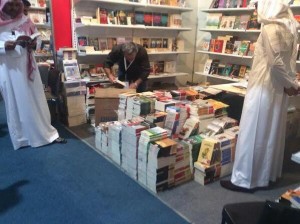 Just a few days after all the works by Saudi publisher Arab Network for Research and Publishing were removed from the Riyadh International Book Fair for violating the Kingdom’s laws, the works of globally celebrated Palestinian poet Mahmoud Darwish caused protests and have reportedly been withdrawn from the fair and are not to be sold:
Just a few days after all the works by Saudi publisher Arab Network for Research and Publishing were removed from the Riyadh International Book Fair for violating the Kingdom’s laws, the works of globally celebrated Palestinian poet Mahmoud Darwish caused protests and have reportedly been withdrawn from the fair and are not to be sold:
Numerous news sources were reporting the removal of the books, while images and videos circulating on Twitter purported to show the protests against Darwish’s ouevre as well as the packing-up of Darwish’s books.
The order was reportedly given Wednesday to remove Darwish’s books from the fair after protestors objected to alleged blasphemy found in his works. A large crowd gathered, and security reportedly had to be called in. After that, the PVPV ordered the books removed.
This came not long after the Arab Network for Research and Publishing (ANRP) stall was removed from the fair and all the house’s books confiscated. In response to the ANRP seizure, Saudi Minister of Culture and Information Dr. Abdulaziz Khoja released a statement that said, in part, “the Kingdom’s security is more important than anything, and trying to destabilize our unity can not be tolerated.”
BY MLYNXQUALEY on
Text and image reposted from arablit.wordpress.com
Tags: Arab Network for Research and Publishing > censorship > Dr. Abdulaziz Khoja > Mahmoud Darwish > Palestine > Riyadh Book Fair
Kumbia Queers @ Queens Museum – March 6, 6-8PM
Posted on February 27, 2014 | No Comments
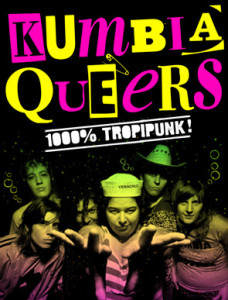 Queens Museum – Open A.I.R. & fD present Kumbia Queers with Que Bajo: Redefining Cumbia, Love and Latinamericanidad
Queens Museum – Open A.I.R. & fD present Kumbia Queers with Que Bajo: Redefining Cumbia, Love and Latinamericanidad
Mar 6 2014, 6:00pm – 8:00pm
An open conversation with the members of Kumbia Queers and Que Bajo regarding cumbia, gender and love in Latin America. Followed by an acoustic set by the Kumbia Queers.
Guests: Kumbia Queers (Argentina-Mexico), Gecko Jones (NYC-Colombia-Puerto Rico), and Uproot Andy (NYC-Canada)
Moderated by: Santo Padre (Mexico-NYC)
Free & Open to the Public
America is a continent marked by migration of bodies, ideas and ideals. It is a region politically divided into countries named and formed by Europeans, mostly man, mostly white or after gold. The vast richness of the continent has attracted people from all over the world for centuries, making it difficult to establish an identity that we can call our own. How does culture shape what we believe, see and hear?
Cumbia began as a slave movement in the Caribbean, and has recently been redefined and reseen by independent musicians across the world. The Kumbia Queers, Gecko Jones and Uprooot Andy are part of this redefinition.
But music is not only music, it implies politics, divisions, and struggles. The Kumbia Queers are the first band in Latin America to produce love songs from girls to girls, and the first openly queer band in the masculine domintated punk-rock scene. This has allowed a redefinition of gender, sexuality, and love as political action.
Through this off track academic presentation, we intend to discuss contemporary Latin American and American issues like womanhood, gender, and slavery.
About the Panelists:
Kumbia Queers are a group of cumbia-punk-rockers that started eight years ago in Argentina. It formed in the underground circles of Argentina, and is formed by independent punk-inspired artists. The group has become an international phenommenon that has led them to growing tours in Europe and the Americas; an edition of their first album in Japan; a documentary film to be released in Chile, and other international presentations in major festivals like Fusion (Germany) and Vive Latino (México). The seven girls that make up Kumbia Queers are also involved in other bands, and independent art movements across the world.
Gecko Jones and Uproot Andy are celebrated internationally for their cumbia production in New York. They are all part of the cultural shift provoked by the redefinition of cumbia. They have hosted Que Bajo for 5 years, a series of parties in New York hosting diverse musicians from Latin America, Africa and other regions of the world.
Santo Padre is a Mexican queerist who develops inter-American projects that allow dialogue, in hopes of democracy and freedom. She is the co-founder of agite y sirva, the traveling videodance film festival in Mexico, and is currently an honorary member of La Pocha Nostra, the performance group founded and directed by Guillermo Gomez Peña.
Co-Presenters:
This program is part of Queens Museum’s Artists Services program, Open A.I.R. It is made possible by a generous grant from The Scherman Foundation’s Katharine S. and Axel G. Rosin Fund. Public Events at the Queens Museum are supported in part by The Kresge Foundation, Surdna Foundation, and The David Rockefeller Fund. Additional support provided by the New York City Department of Cultural Affairs and New York State Council on the Arts with the support of Governor Andrew Cuomo and the New York State Legislature.
Founded in 2008 by Uproot Andy and Geko Jones, the NYC tropical dance party Que Bajo has been influential in changing the sound NYC nightlife. The residents’ now widely known remixes and productions mix the folkloric music of Latin America with modern electronica. Initially intended as an outlet for this new sound (often known as Tropical Bass), Que Bajo has increasingly become a showcase for an ever evolving array of new musical trends emanating from around the globe. Nominated for ‘Best Party’ in the 2010 Paper Magazine Nightlife Awards and named by Timeout NY as NYC’s Top Latin Underground Party, Que Bajo continues to host many of the young artists and DJs on the cutting edge of these new sounds. 2013 saw the launch of Que Bajo Records releasing a steady stream of remixes and club edits that give the now famous party its signature sound.
Tags: Gecko Jones > Kumbia Queers > Open A.I.R. > Que Bajo > Queens Museum > Santo Padre > Uproot Andy
Shahid Nadeem’s THE ACQUITTAL reading – Friday, February 22
Posted on February 20, 2014 | No Comments
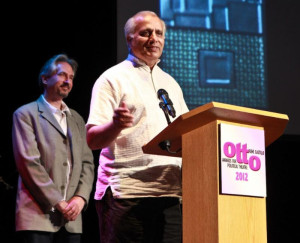 Castillo Theatre presents a play reading of:
Castillo Theatre presents a play reading of:
The Acquittal by Shahid Nadeem // reading directed by Dan Friedman
Saturday, February 22 at 5:00pm // Admission is free. Reservation required.
To make your reservation call 212-941-1234 or email boxoffice@allstars.org
The Castillo Theatre invites you to a reading of The Acquittal by the award-winning playwright, Shahid Nadeem, (translated from Urdu by Tahira Naqvi). The reading is being directed by Castillo’s artistic director Dan Friedman and will be held on Saturday, February 22 at 5:00 p.m.
Shahid Nadeem is considered Pakistan’s foremost playwright and is the executive director of Ajoka Theatre located in Lahore. Ajoka was recognized witt a 2012 Otto Rene Castillo Award for Political Theatre. Nadeem is a socially and politically engaged artist who was imprisoned in 1969, 1970 and 1978 for his writings and opposition to military rule. Nadeem was adopted as a prisoner of conscience by Amnesty International and while he was in exile he worked for Amnesty as its International Campaign Coordinator in London and as Asia-Pacific Communications Officer in Hong Kong. Nadeem has won numerous theatre and writing awards including President of Pakistan’s Pride of Performance Award, as well as the Gursharan Singh Award for Theatre Commitment in India (2005). Nadeem is currently in the U.S. as a fellow with the National Endowment for Democracy.
The Acquittal, originally written in 1987 while Nadeem was in exile in London, is the story of four women from various social strata who find themselves in the same prison cell under General Zia-ul-Haq’s Hudood Ordinances.
The reading will be followed by a conversation with the playwright
Tags: Ajoka Theatre > Castillo Theatre > Dan Friedman > Shahid Nadeem > The Aquittal
Theatrum Mundi launches “Designing for Free Speech” challenge
Posted on February 11, 2014 | No Comments
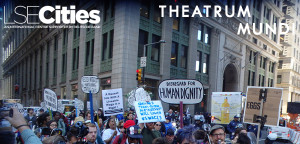 Theatrum Mundi, in partnership with the American Institute of Architects, New York, has launched a “Designing for Free Speech” challenge. The challenge asks architects, designers, activists, artists — and anyone interested in imagining new spaces in the city for free expression — to identify public spaces in New York City and propose re-designs that transform them into places that activate the rights enshrined in the First Amendment.
Theatrum Mundi, in partnership with the American Institute of Architects, New York, has launched a “Designing for Free Speech” challenge. The challenge asks architects, designers, activists, artists — and anyone interested in imagining new spaces in the city for free expression — to identify public spaces in New York City and propose re-designs that transform them into places that activate the rights enshrined in the First Amendment.
Applicants will propose architectural or performative designs (temporary or permanent) that transform spaces in New York City into places for public “demonstration.” This challenge is about re-imagining and idealizing existing spaces that have the potential for animating the public, especially spaces that are not traditionally considered in this frame. Submissions will be accepted through March 31, 2014.
“New York City has a rich history of creative and political expression,” says Stephen Duncombe, project director and Theatrum Mundi fellow, “but with the privatization of public space, the surveillance of political communications, the commercialization of creative expression, and the virtualization of social gatherings, we want to imagine how we can transform spaces in the city into places for free expression. The Designing for Free Speech challenge offers a forum to do this.”
This open call is free to enter for any interested, interdisciplinary teams at www.designingforfreespeech.org and consists of three parts:
- Identification a public space in New York City that could benefit from a more active and interactive social or political engagement.
- Design plans for a physical transformation of, or performative intervention within, this space.
- Description of how the proposed plan would be implemented.
A jury will select eight featured proposals to be exhibited and be awarded a small sum toward their implementation. The public will select two additional featured proposals via an online voting system.
Theatrum Mundi is a professional network of urbanists and artists in different cities, which is co-directed by Richard Sennett, Saskia Sassen, and Richard Burdett. The collective consists of academics, architects, planners, performing and visual artists, with the aim to stimulate discussion about practices spanning stage and street. www.theatrum-mundi.org
Tags: American Institute of Architects > Designing for Free Speech > Theatrum Mundi
‘The campaign “free Pussy Riot” is over’
Posted on February 7, 2014 | No Comments
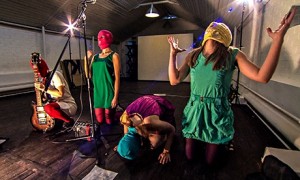 Statement by the Anonymous members of Pussy Riot: Garadja, Fara, Shaiba, Cat, Seraphima and Schumacher
Statement by the Anonymous members of Pussy Riot: Garadja, Fara, Shaiba, Cat, Seraphima and Schumacher
We, the anonymous members of Pussy Riot, would like to say many thanks to all the people who have supported us, those who demanded the release of our members, those who sympathised with us and sympathised with our ideology. We are very grateful to all of you; we deeply appreciate and respect everyone who has contributed to the Pussy Riot campaign.
Our joint efforts were not in vain: Vladimir Putin had to bend under the pressure of the international community and let Nadia and Masha free. Thus, 23 December was a real celebration for us – the liberation day of prisoners of conscience and the liberation of the entire Pussy Riot.
But the amnesty is certainly not the end of our dreams. We demand real justice: that is, the complete abolition of the verdict and the recognition that the entire criminal case against Pussy Riot was illegitimate.
We hope that justice will be restored on 21 February, the anniversary of our teasing performance in Christ the Saviour Cathedral, with the song “Mother of God, put Putin away!”
We are very pleased with Masha and Nadia’s release. We are proud of their resistance against the harsh trials that befell them, and their determination by all means to continue the struggle they had started during their time in the colonies.
Unfortunately for us, they became so carried away with the problems in Russian prisons that they completely forgot about the aspirations and ideals of our group – feminism, separatist resistance, the fight against authoritarianism and personality cults, all of which caused their unjust punishment.
It is no secret that Masha and Nadia are no longer members of the group, and will no longer take part in radical actionism. Now they are engaged in a new project, as institutionalised advocates of prisoners’ rights.
But such advocacy is hardly compatible with radical political statements and provocative works of art – just as gender conformity is not compatible with radical feminism.
Institutionalised advocacy can hardly afford a critique of fundamental norms and rules that underlie modern patriarchal society. Being an institutional part of society, such advocacy cannot go beyond the rules set forth by this society.
Yes, we have lost two friends, two ideological teammates, but the world has acquired two brave human rights defenders – fighters for the rights of Russian prisoners.
Unfortunately we cannot congratulate them in person because they refuse to have any contact with us. But we appreciate their choice and sincerely wish them well in their new career.
At the moment we are witnessing an outrageous collision: even though Nadia and Masha are the focus of the media and the international community and crowds of journalists heed their every word, so far no one is listening to them.
In almost every interview they repeat that they have left the group, that they are no longer Pussy Riot, that they act in their own names, that they no longer engage in radical art activities. However, headlines are still full of the group’s name, all their public appearances are declared as performances of Pussy Riot, and their personal withdrawal from Pussy Riot is treated as the termination of the entire collective, thus ignoring the fact that, at the pulpit of Christ the Saviour Cathedral, there were not two but five women in balaclavas, and that the performance in Red Square had eight participants.
The apotheosis of this misunderstanding was the announcement by Amnesty International of Masha and Nadia’s appearance in Barclays Center in New York as the first legal performance of Pussy Riot.
Moreover, instead of the names Nadia and Masha, the poster of the event showed a man in a balaclava with an electric guitar, under the name Pussy Riot, while the organisers smartly called for people to buy expensive tickets.
All this is an extreme contradiction of the very principles of the Pussy Riot collective: we are an all-female separatist collective – no man can represent us either on a poster or in reality. We are anti-capitalist – we charge no fees for people to view our artwork, all our videos are distributed freely on the web, the spectators at our performances are spontaneous passersby, and we never sell tickets to our “shows”.
Our performances are always illegal, staged only in unpredictable locations and public places not designed for traditional entertainment. The distribution of our clips is always through free and unrestricted media channels.
We are anonymous because we act against any personality cult, against hierarchies implied by appearance, age and other visible social attributes. We cover our heads because we oppose the very idea of using female faces as a trademark for promoting any sort of goods or services.
The mixing of the rebel feminist punk image with the image of institutionalised defenders of prisoners’ rights is harmful to us as a collective, and harmful to the new role that Nadia and Masha have taken on.
Hear them finally!
Since Nadia and Masha have chosen not to be with us, please, respect their choice. Remember, we are no longer Nadia and Masha. They are no longer Pussy Riot.
The campaign “free Pussy Riot” is over. We, as an art collective, have an ethical right to preserve our art practice, our name and our visual identity, distinct from other organisations.
Image and text re-posted from Guardian.com
Tags: Amnesty International > Maria Alyokhina > Nadezhda Tolokonnikova > Pussy Riot > Vladimir Putin
‘Public Secrets’ – Performance & Screening – Saturday, January 11 6-9PM
Posted on January 7, 2014 | No Comments
 ‘Public Secrets’: Arts, Culture and Contemporary Indonesian Politics after the Fall of Suharto
‘Public Secrets’: Arts, Culture and Contemporary Indonesian Politics after the Fall of Suharto
Location: Project Reach NYC. 39 Eldridge Street, 4FL. New York NY, 10002
Performance by Arahmaiani /Screening of Erika Baglyas’s film Honestly featuring CM Rien Kuntari
Conversation with Arahmaiani & CM Rien Kuntari
1998, in the wake of the Asian financial crisis and the resignation of General Suharto after 32 years in power, was a tumultuous year for Indonesia. Promises of long-overdue democratic reform were quickly overshadowed by persistent political and economic instability, rampant corruption, civil unrest and terrorism. Performance artist Arahmaiani and war journalist Cordula Maria Rien Kuntari were witness to this important historical moment and its aftermath, both as insiders and outsiders. In addition to a shared national identity, both women share the common experience of being forced to leave their countries of origin as a result of their professional practice as it served to interrogate abuses of power and the hypocrisy of politics in their country.
‘Public Secrets’: Arts, Culture and Contemporary Indonesian Politics after the Fall of Suharto brings these two powerful ‘witnesses’ together to discuss the evolution of Indonesian politics over the past 15 years and the role of arts and culture both as a form of critique and a catalyst for positive social change.
Arahmaiani is one of Indonesia’s most respected and iconic contemporary artists, and her work is internationally recognized for its powerful and provocative commentaries on social and cultural issues. In the 1980s and ’90s, she established herself as a pioneer in the field of performance art in Southeast Asia, although her practice also incorporates a wide variety of media, including video, installation, painting, drawing, and sculpture. Since her first exhibition in 1980, her work has been included in over one hundred solo and group exhibitions around the world, including: the Venice Biennale (2003); Biennale of the Moving Image, Geneva (2003); Gwangju Biennale (2002); Bienal de São Paulo (2002), Performance Biennale, Israel (2001); Biennale de Lyon (2000); Werkleitz Biennale (2000); Bienal de la Habana (1997); Asia Pacific Triennial (1996); Yogya Biennial, (1994).
CM Rien Kuntari is an Indonesian born freelance journalist. She spent most of her career with Kompas Daily in Jakarta. During her tenure at Kompas Daily she made journalistic visits in more than 50 countries in Asia, Europe, America, Africa, and the Middle East. Kuntari was also a war correspondent covering the Gulf War (Iraq 1991), the Rwanda Genocide (1994), the Iraq Referendum (1995 and 2002), Cambodia (1996) and East Timor until its independence (1992-2002). She was a presidential correspondent from Soeharto to Abdurrahman Wahid. In 2009, just one month after she published her book about East Timor’s bloody independence and after almost twenty years of service, she was fired by Kompas Daily due to the “controversy” surrounding her truthful reporting. East Timor, The Final Hour: a Journalist’s Notes is the first book about the painful birth of the Republic Democratic of Timor Leste written by an Indonesian civilian author that has been resulting to her travelling to the United States without any chance to go back to her homeland. She is currently living in the New York City as an independent writer.
Co-presented by the Queens Museum & freeDimensional.
Also, check out Arahmaiani’s solo exhibition ‘Fertility of the Mind’ at Tyler Rollins Fine Art on view till February 22.
Tags: Arahmaiani > CM Rien Kuntari > Erika Baglyas > Fertility of the Mind > Indonesia > Project Reach > Tyler Rollins Fine Art
Art and Activism on the World Stage @ Adelphi University
Posted on December 2, 2013 | No Comments
 The Levermore Global Scholars Program is partnering with freeDimensional to bring guest speaker Ademola Bello, an international artist, to campus.
The Levermore Global Scholars Program is partnering with freeDimensional to bring guest speaker Ademola Bello, an international artist, to campus.
Thursday, December 5, 2:00–3:00 p.m
Location: Campbell Lounge, Room 1
About the Artist:
Ademola Bello is a Nigerian playwright, journalist, and novelist who has used his plays and dramatic writing to give a voice to oppressed communities and speak truth to power around the world. He will share his international journey, experiences, and struggles to use the arts as a tool for social change.
His play The Black Cockerel was produced in June 2009 at Out North Theatre in Anchorage, Alaska. He received a Residency to Eugene O’Neill National Playwrights Conference in Waterford, Connecticut, and also won both the Audience and Panelist Choice Awards at the Last Frontier Theatre Conference in Valdez, Alaska for his play The Blackguard Prince. His plays have enjoyed staged readings at New York Actors Studio, Lark Play Development Center, and Frederick Loewe’s Room. He has been profiled in American Theater Journal and has appeared as a guest on ESPN Outside the Lines. Mr. Bello recently finished a thriller novel titled A Prisoner from Cell 7 and is currently working on a new play entitled Change: A Comedy in Two Acts. His work has been featured in New York Amsterdam Newspaper, Anchorage Press Newspaper, Real Clear World, Encyclopedia Britannica, and The Huffington Post. He holds an M.F.A. from New York University and is completing a second master’s degree at Columbia University’s School of Journalism. He is a member of the Dramatists Guild of America and lives in Brooklyn, New York.
Sponsored by the Levermore Global Scholars Program.For more information, please contact:
Peter DeBartolo
Administrative Director
Levermore Global Scholars
p – 516.237.8627
e – pdebartolo@adelphi.edu
Tags: Adelphi University > Ademolla Bello > Levermore Global Scholars Program > Nigeria > The Black Cockerel
Mexico City Consultation on Free Expression and Cultural Rights – November 13 & 14
Posted on November 13, 2013 | No Comments
 On November 13 & 14, fD in partnership with El Centro Cultural de Espana in Mexico is hosting a two day consultation meeting on free expression and cultural rights in Mexico and Central America. 45 representatives from the arts, culture and human rights sectors will attend the consultation to exchange experiences, issues and problems, and mechanisms of support as they relate to different forms of creative activism.
On November 13 & 14, fD in partnership with El Centro Cultural de Espana in Mexico is hosting a two day consultation meeting on free expression and cultural rights in Mexico and Central America. 45 representatives from the arts, culture and human rights sectors will attend the consultation to exchange experiences, issues and problems, and mechanisms of support as they relate to different forms of creative activism.
What: 2-day consultation / workshop with artists, culture workers and activists from Mexico and Central America
Why: Objectives:
- to collectively explore local/regional issues and situations of danger to artists and culture workers whose work is linked to social justice and free expression
- to collectively identify strategies for a) protection from threats in advance of a controversial cultural manifestation; b) strategies to protect the artists or culture worker from danger following actual threat or harm; c) strategies for identifying safe havens to remove the artist or cultural worker from danger; d) creating networked support to offer legal, financial, psycho-social and other assistance; e) creating networked support for supporting the artist or cultural workers’ continued work in the community
- to collectively adapt, re-write and own a version of freeDimensional’s ‘Advo-kit’ (a DIY manual for protecting artists and culture workers in distress) tailored to the local and regional contexts in Mexico and Central America
- to seed the development of local and regional artists safety support networks that can be activated to serving the needs of individuals and communities under threat
How: freeDimensional uses grassroots methods to bring local partners together who have a natural complementarity yet may not normally work together to form a cross-sector support network for endangered artists and cultural workers. Starting with a series of in-depth local visits and meetings, key actors are identified including: arts collectives, individual artists, activist groups, human rights defenders, free speech NGOs or social movements. Taking into consideration the compounded effects of varying forms of repression on identity groups such as LGBT, women, indigenous peoples, youth or others, follow up consultation meetings highlight the issues, topics and themes relevant to the local situation and create a space for participants to brainstorm local/regional options, possibilities and safety mechanisms. This inclusive process aims to connect and catalyze a regional network inclusive of artists, culture workers, journalists, human rights defenders, social justice movements, indigenous communicators, arts educators, etc. that can be mobilized to deliver holistic support to those who need it. At the end of the process, a tangible deliverable will be a version of fD’s Creative Safe Haven Advo-kit adapted and re-worked to directly address culture worker safety and readiness in relation to local and regional contexts.
Check in for updates to follow.
Tags: Central America > Cultural Rights > El Centro Cultural de Espana > free expression > Mexico City
Constitutional Court Admonishes Prosecutors Over Abuse Of Insult Laws As Visual Artist Maseko Wins In Court
Posted on November 1, 2013 | No Comments
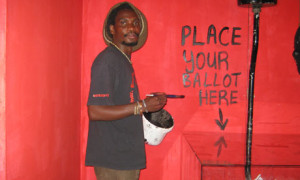 Press Release: 30 October 2013
Press Release: 30 October 2013
Zimbabwe Lawyers for Human Rights (ZLHR) is encouraged by the decisions passed on Wednesday 30 October 2013 by the Constitutional Court in two constitutional matters brought before it challenging the constitutionality of some offensive provisions of the Criminal Law (Codification and Reform) Act.
In the case of Mr Tendai Danga, the Constitutional Court struck off the matter from the court roll after the National Prosecuting Authority (NPA) withdrew the charges preferred against the Bulawayo resident. Tendai Danga faced charges of undermining authority of or insulting President Robert Mugabe in contravention of Section 33 (2) (a) (ii) of the Criminal Law (Codification and Reform) Act (Chapter 9:23) in a matter that commenced more than two years ago.
The State, represented by Mr Uladi from the NPA was quick to concede that the facts in the original matter did not disclose the offense of insulting the President.
This prompted Deputy Chief Justice Luke Malaba to issue a stern warning to the NPA to review similar cases and to ensure that only deserving cases were brought to the Constitutional Court. He admonished the NPA against prosecuting matters in which statements were uttered in drinking halls and other social places, as the pursuit of such frivolous matters only served to bring disrespect on the Office of the President.
This comes in the wake of close to 80 similar cases which are currently pending before the Constitutional Court and other subsidiary courts of the land. Since 2010, there has been a dramatic increase in the arbitrary application of Section 33 of the Criminal Law (Codification and Reform) Act (Chapter 9:23), where individuals have been charged with allegedly “insulting or undermining the authority of the President”.
Prosecutors had claimed that Danga, who was represented by Zimbabwe Lawyers for Human Rights, had questioned the integrity of the Zanu PF leader as President of the Republic of Zimbabwe.
In the other matter, the Constitutional Court on Wednesday 30 October 2013 declared as unconstitutional Sections 31 (a) (iii) and 33 (a) (ii) of the Criminal Law (Codification and Reform) Act (Chapter 9:23) as they were in contravention of Sections 20 (1), 19 (1) and 18 (1) of the former Constitution of Zimbabwe.
In a unanimous decision in the matter of Owen Maseko v the Attorney General, SC60/11, the Constitutional Court granted a consent order stating that the State represented by Mr Chris Mutangadura of the NPA had not shown that Sections 31 (a) (iii) and 33 (a) (ii) of the Criminal Law (Codification and Reform) Act (Chapter 9:23) are not in contravention of Sections 20 (1), 19 (1) and 18 (1) of the former constitution.
In an order handed down by DCJ Malaba, the highest court asked Justice, Legal and Parliamentary Affairs Minister Emmerson Mnangagwa to appear before the highest court on 20 November 2013 to show cause why Sections 31 (a) (iii) and 33 (a) (ii) of the Criminal Law (Codification and Reform) Act (Chapter 9:23) should not be declared to be in contravention of Sections 20 (1), 19 (1) and 18 (1) of the former Constitution of Zimbabwe.
Maseko, who was also represented by ZLHR, petitioned the Constitutional Court seeking an order to declare as unconstitutional laws infringing on artists’ rights to free expression and freedom of conscience, particularly freedom of thought as guaranteed in the Constitution. The visual artist was arrested in March 2010 and charged with contravening Sections 31 (a) (iii) and 33 (a) (ii) of the Criminal Law (Codification and Reform) Act (Chapter 9:23) for staging an exhibition in Bulawayo depicting the 1980s Matabeleland massacres known as Gukurahundi carried out by a crack military unit on the instructions of the government. Maseko was accused of undermining the authority of or insulting the President and causing offence to persons of a particular race or religion. His exhibition, which showcases paintings that explored the torture and massacres that characterized the civil unrest known as Gukurahundi, was forcibly shut down.
For more information visit: www.zlhr.org.zw
Image reposted from TheGuardian.com
Tags: owen maseko > Robert Mugabe > Zimbabwe > Zimbabwe Lawyers for Human Rights









